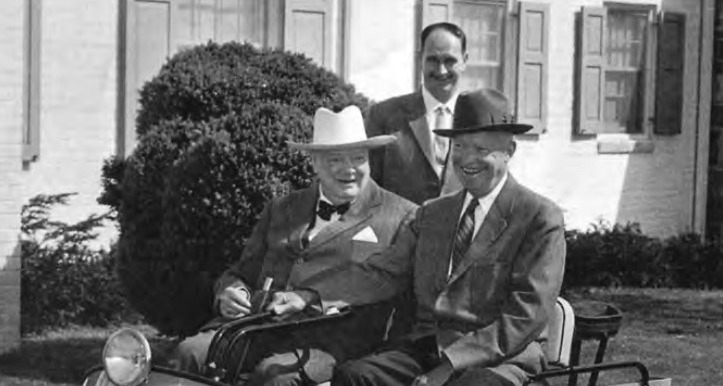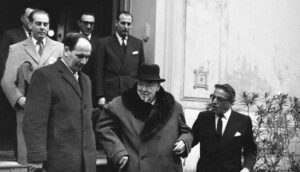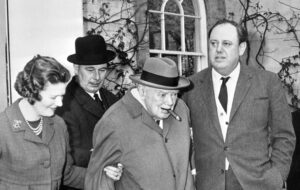
Remembering Eddie Murray, Churchill’s Bodyguard 1950-65
Reprinted from “Great Contemporaries: Edmund Murray,” written for the Hillsdale College Churchill Project. For the original article with other images, click here. To subscribe to weekly articles from Hillsdale-Churchill, click here, scroll to bottom, and enter your email in the box “Stay in touch with us.” We never spam you and your identity remains a riddle wrapped in a mystery inside an enigma.
***
Steve Winduss, whose Batting the Breeze podcast refers to Hillsdale College’s piece on Churchill’s meetings with Margaret Thatcher, prompts this reflection on Sir Winston’s longest-serving bodyguard. Edmund Murray served Churchill for fifteen years. Steve interviewed Eddie’s son in a three-part podcast. “I became very attached to Edmund and his unique and colourful life during that period,” Steve writes. “I would have certainly enjoyed meeting him as you did.” In the belief that others might like to know more about Sergeant Murray, I reprise what I wrote after his death in 1996. —RML
“Who is there to talk of?”
Edmund Murray, Sir Winston Churchill’s bodyguard from 1950 to 1965, was born the same year as John F. Kennedy, and underwent similar hair-raising adventures in the same war. He died on the eve of his eightieth birthday and the golden anniversary of his marriage to Beryl, the charming Swiss lady who shared his life after 1947.
Born in County Durham, Murray joined the French Foreign Legion soon after leaving school. After the war he joined the Metropolitan Police. In 1950 he was seconded to Chartwell for protection duties with the Leader of the Opposition.
He recorded his life as a Legionnaire and with Churchill in his 1987 book, I Was Churchill’s Bodyguard. This was expanded in a series of 1995 tapings for the Imperial War Museum. Eddie remained in his trying job to the end. I will never forget the words he uttered when Sir Winston died: “Who is there to talk of?”
The Murray presence

I met Edmund Murray on our first Churchill Tour in 1983, when he heard we were stopping at Bath and joined us for lunch. At first he struck me as T.E. Lawrence had struck Churchill: “A very remarkable character, and very careful of that fact.” Eddie was not inclined to hide his light under a bushel, and what he most loved to talk about was Sir Winston. His droll stories were the life of every Churchillian party.
Over the years, I observed a certain mellowing in his manner. He certainly grew more piquant. He once quoted Labour Prime Minister Harold Wilson’s reference to “Sir Winston’s detective, now dead.”
“By my presence here,” Eddie remarked, “I offer you undeniable proof that no one can trust the pronouncements of politicians.”
Over the next few years his talks became more polished, more rounded and reflective. Perhaps his many appearances, often before youngsters—whose company he loved—allowed him to sit back and take a longer look at the experiences life had so uniquely placed in his way.
Multi-tasking
Edmund Murray, thirty-three, met Winston Churchill, seventy-five, in 1950. From that day to the end he was ubiquitous, and rarely from WSC’s side. Anthony Montague Browne, who served as private secretary from 1952, was likewise omnipresent:
Sergeant Murray found himself concerned with aspects of his charge which were not really part of his functions. Particularly after Churchill’s resignation as prime minister, there was no longer a large back-up staff. Eddie was effective in matters such as passports at airports, access and exits at meetings, and generally making Churchill’s everyday life smoother.
Murray anecdotes were fun. Once at Shannon Airport, he told me, Churchill’s plane stopped to refuel en route to America. Eddie strode to the duty-free shop to buy a case of Jameson’s for his Secret Service pals in Washington. “What name shall I put on the box?” said the clerk. “Murray,” Eddie told him.
Arriving back to pick it up, the clerk was in full Irish brogue: “So what’s a man with the name of Murray doing working for an old b—— like Churchill?”
Eddie related this to WSC, who roared with laughter. Lady Churchill was not amused. “He was wrong, Winston, he was quite wrong. You do know who your father was!”
Murray also liked to recall the somewhat trying job of keeping admirers away from a boss who did not like being disturbed. This often occurred at Monte Carlo, which Churchill loved for its cuisine and casino.
One evening at dinner a world-famous celebrity spotted WSC: “I want to say hello to my hero, Sir Winston.” The boss didn’t recognize him and signaled to Eddie, who politely ushered a fuming Frank Sinatra to the door. “Did you know who Frank’s friends were?” I once asked him….
Painter and pursuers
“I remember him being in charge of Churchill’s painting arrangements,” continued Anthony Montague Browne. “Sergeant Murray himself painted, as he describes in his book, and was well attuned to Churchill’s idiosyncrasies in this field. He was particularly useful in the increasing periods that Churchill spent in the South of France in his retirement. His fluent French ensured smooth liaison with the local police.”
Sometimes his French was over-fluent, tipping the paparazzi on Churchill’s intended painting expeditions. This kept them easier to control during more serious moments when the boss was meeting with the “Good and the Great”—and incidentally kept Eddie supplied with champagne.
Once the press gaggle grew to such proportions that Anthony suspected a “mole” in the staff. One at a time, he announced to each staffer a fictitious time and venue for the next day’s painting expedition, then checked the spot for media. Sure enough, the trick led him to Sergeant Murray, whose champagne quota was commensurately reduced.
Longtime secretary Grace Hamblin had a stern sense of loyalty and was incensed when she learned of Eddie’s transgression. Significantly, the boss was not bothered at all. Grace herself told me that when she voiced disapproval, Sir Winston just snorted: “Well, you don’t like anyone.”
“A real affection”
Anthony Montague Browne was equally magnanimous:
To be a bodyguard must be a soul-destroying occupation, waiting about for hours and hours with very little to do, but bearing a real responsibility for the well-being of the personality in one’s charge.
We tend to see history from a different point of view. I am bound to say that where I was present at some of the events Sergeant Murray describes, they struck me rather differently. In the words of Field Marshal Robertson, ‘I ’eard different.’ It was all too easy to succumb to irritation with Sergeant Murray at times, but his devotion to Churchill was genuine, and I have no doubt that if danger had threatened he would have stood before him.”
It was all too easy to succumb to irritation with Sergeant Murray at times, but his devotion to Churchill was genuine, and I have no doubt that if danger had threatened he would have stood before him.
He certainly made the great man’s life easier, Anthony added:
The Boss, I think, had a real affection for him. It was Churchill’s inevitable reaction to stand up for any member of his entourage who was under attack. As Lady Churchill once said (looking at me rather pointedly): “Winston is always ready to be accompanied by those with considerable imperfections.”
Old Victory’s pride

I do know this, and I know it as a certitude: One of Eddie’s last speeches was one of the finest ever made about Sir Winston Churchill. It ranks with those of Alistair Cooke, Martin Gilbert, Bill Buckley and Robert Hardy. Here is how he wound it up:
*
I escorted Sir Winston on his last visit to the House of Commons on Monday, 27 July 1964. He had been sixty-four years in politics.
On Saturday, 9 January 1965, he was very quiet at dinner and wanted neither brandy nor a cigar. Only in the early hours was he persuaded to go to his bed. He never got out of it again.
That man had brought Britain through the greatest struggle in its history. Though he did admit to me on several occasions that God had been on his side, his was the voice, the spirit, the courage, the determination. So, from a balcony in Whitehall on 8 May 1945, the descendant of the First Duke of Marlborough proclaimed: “God bless you all. This is your victory. Everyone, man or woman, has done their best.”
Ladies and gentlemen, the Churchill I knew was the epitome of all that was ever good and fine in our island race and he was always proud of his American heritage. Yes, he made mistakes, but then only those who do nothing do not. Always his aim was to make Britain great, and to join all European countries in peace and freedom.
We all have a job to do and indeed the tools to do it are in our hands. Vivre a jamais dans l’esprit des gens, n’est-ce pas l’immortalite? There is the heritage he left us, our raison d’etre. May we all be worthy of his trust.
Related reading
“At Bladon, Fifty-nine Years On: Echoes and Memories,” 2024.
“Winston Churchill on War, Part 3: Anthony Montague Browne,” 2022.
“The Churchill Tours 1983-2008: A Certain Splendid Memory,” 2024.







One thought on “Remembering Eddie Murray, Churchill’s Bodyguard 1950-65”
Just a note to say how pleasing it was to read your kindly worded article about my grandfather. I have forwarded the link to the family. My Dad, Bill, has been quite active in recent times talking about Churchill, and our family’s connection, so it will no doubt be of interest to him. I’m not sure I recall hearing of the speech you describe in the final paragraph, so that was wonderful to read. With best wishes, Andy Murray, Bristol, UK
–
Thank-you, Andy. It was a privilege to know your grandfather and hear his many recollections. That speech of his was given to a small Churchill party on one of my tours of “Churchill’s England.” It now has a wider readership Eddie was a kind man, and devoted to the Heroic Memory. —RML
Comments are closed.